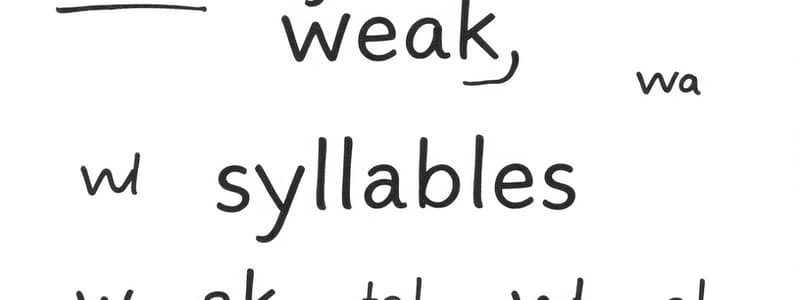Podcast
Questions and Answers
Which close front vowel is mentioned as commonly found in weak syllables?
Which close front vowel is mentioned as commonly found in weak syllables?
- e:
- æ
- ɪ
- i: (correct)
In which English accent does the second syllable of 'easy' sound most like the i: vowel?
In which English accent does the second syllable of 'easy' sound most like the i: vowel?
- Welsh accent (correct)
- Received Pronunciation
- Yorkshire accent
- Cockney accent
What is the nature of the distinction between vowels in weak syllables?
What is the nature of the distinction between vowels in weak syllables?
- The distinction is completely absent.
- The distinction is only evident in strong syllables.
- The distinction is not very clear. (correct)
- The distinction is very clear.
Which pair of words raises the question about the vowel phoneme in 'to'?
Which pair of words raises the question about the vowel phoneme in 'to'?
In present-day BBC pronunciation, how clear is the distinction between corresponding close back rounded vowels?
In present-day BBC pronunciation, how clear is the distinction between corresponding close back rounded vowels?
Study Notes
Weak Syllables
- Two vowels common in weak syllables are close front (i:/ɪ) and close back rounded (u:/ʊ).
- It’s difficult to distinguish i: from ɪ or u: from ʊ in weak syllables.
- Example: In “easy” and “busy”, the second syllable has a vowel sound, but it’s difficult to tell which one it is.
- Different accents pronounce these vowels differently in weak syllables.
- Welsh accents pronounce the second syllable of “easy” as i:, while Yorkshire accents pronounce it as ɪ.
- In BBC pronunciation, the distinction is uncertain.
- The same uncertainty applies to close back rounded vowels in weak syllables.
- For example, in “good to eat” and “food to eat”, it’s unclear whether “to” is pronounced with the u vowel of “good” or the u: vowel of “food”.
Vowel Sounds in “to”
- In “I want to”, the vowel sound in “to” is also uncertain.
Studying That Suits You
Use AI to generate personalized quizzes and flashcards to suit your learning preferences.
Description
Explore the complexities of weak syllables and vowel sounds in various accents. This quiz will test your understanding of how close front and back rounded vowels are pronounced in weak syllables. From examples like 'easy' and 'busy' to the vowel sound in 'to', assess your knowledge of this fascinating aspect of pronunciation.




